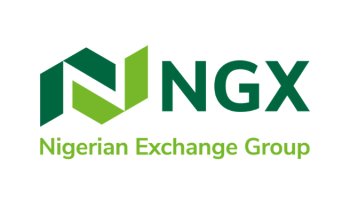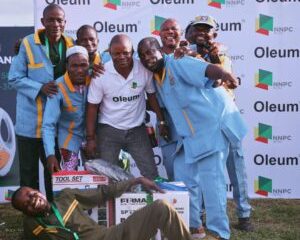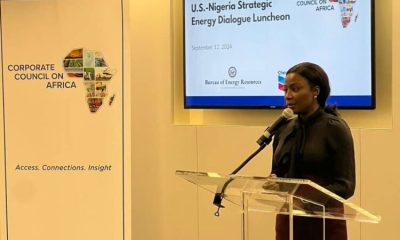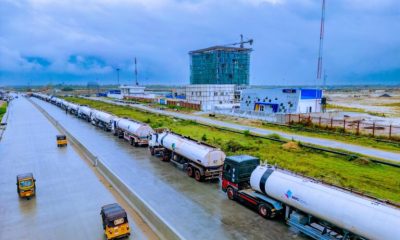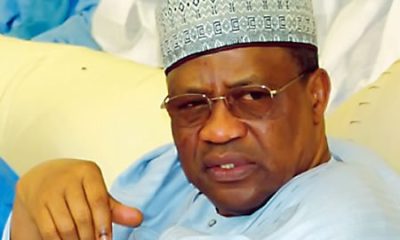Oil & Gas
NNPC Weekly Review: Facts Behind NNPC N287bn Profit after 4 Decades
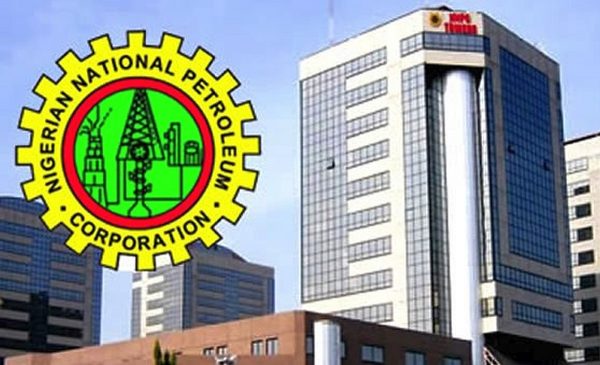
The Nigerian National Petroleum Corporation (NNPC) has made the country proud in the week with the release of its 2020 audited report and the posting of ₦287 billion profit after tax in the 2020 financial year.
This achievement was the first of its kind since its 44 years existence.
The Group Managing Director, Malam Mele Kyari, while addressing newsmen in Abuja gave insight into the measures adopted by his management to achieve the feat.
He attributed the turn-around of the Corporation from a loss of ₦803bn in 2018 to profit of ₦287bn in 2020 to the aggressive implementation of cost-cutting measures, improved efficiency through business automation, emphasis on commercially-focused investments and non-interference in the management of the Corporation from any quarters.
Kyari also added that the Corporation saved a lot of cost through contract renegotiation by up to 30 per cent on the heels of the Covid-19 pandemic, introduction of technology that drastically cut travel cost through reduction in in-person meetings and the general automation of processes that enhanced efficiency across the group’s businesses.
He said that Management’s focus on the prioritisation of investment and staff welfare also helped in boosting the Corporation’s overall productivity and bottom line.
Also, the Minister of State for Petroleum Resources, Chief Timipre Sylva, congratulated the GMD, Management and staff of the Corporation on the feat of posting profit for the first time since its incorporation in 1977.
He said NNPC’s emergence from loss into profitability, coming shortly after the signing into law of the Petroleum Industry Bill, was a proud moment for him, adding that this was a season of achievements for the nation’s oil and gas sector.
Still on the week under review, the Nigerian Petroleum Development Company Limited (NPDC) a subsidiary of the NNPC pledged cooperation with the Ogoni people to resume oil exploration in the abandoned oil wells for the benefit of the community and the country.
The Managing Director of NPDC, Mr Mohammed Ali-Zarah, said the company understood the concerns and yearnings of the Ogoni people and shared in their pain.
He said NPDC and the Federal Government would work with the Ogoni people to bring development, employment and growth to the land, remediate the environment and ensure that future exploration and production activities do not impact negatively on the environment.
Ali-Zarah further said the event organized by the Ogoni Liberation Initiative and the large turn-out of people, including traditional rulers, have buoyed NPDC’s confidence in its re-entry plan.
He observed that it was in the best interest of the country to speedily restore the environment of Ogoniland and create the needed condition for the social economic development of the communities.
On the communique submitted by the Ogoni Liberation Initiative signed by leaders of various communities that make up Ogoni land, Mr Ali-Zarah assured them that he would send the document to the management of the NNPC for onward transmission to the relevant quarters, including the Presidency.
Earlier, the Convener and leader of the Ogoni Liberation Initiative, organizers of the event, Rev. Douglas Fabeke, said the Ogoni people welcomed with great joy the intervention of the Federal Government and the takeover of the oil assets by NPDC following the judgement of the Appeal Court in Abuja.
He described the judgment and subsequent takeover of the assets by NPDC as liberation for the Ogoni people, stressing that the people of Ogoni have “looked forward to this freedom over the years”.
Rev. Fabeke assured the Federal Government that the people of Ogoni would support all efforts aimed at restoring the environment and exploring its huge natural resources for the benefit of the people.
He called on Ogoni leaders to eschew bitterness and work with the Federal Government to ensure that the people benefitted from the resources in their land.
He submitted a communique on behalf of the people of Ogoni to the Federal Government as the request of Ogoni people and as condition for the mutual relationship between the people and NPDC.
Oil production operations were suspended in Ogoni land in the early 1990s due to disruptions caused by local unrest. The oilfields and other installations have since largely remained dormant.
Hope was, however, rekindled recently following an Appeal Court judgment that paved the way for NPDC to take over the operatorship of the oil assets in Ogoni land from Shell.
Also, the GMD received accolades from the House of Representatives Committee on Finance for providing detailed explanations on some burning oil industry issues at an interactive session on the 2022-2024 Medium Term Expenditure and Revenue Framework (MTERF) and Fiscal Strategy Paper (FSP).
Chairman of the House Committee on Finance, Hon. Abiodun Faleke, commended the GMD for providing an in-depth explanation and insider perspective on some issues surrounding the operations of the NNPC and the oil industry stating: “You have made our day. The committee is better informed based on explanations provided by the GMD.”
Kyari, in his presentation, provided a base oil price scenario in the medium term as follows: 57 dollar per barrel for 2022, 61dollar per barrel for 2023 and 62 dollar per barrel for 2023.
He explained that the assumptions were arrived at after a careful appraisal of the three-year historical dated Brent Oil Price average of 59.07 dollar per barrel premised on Platts Spot Prices.
“Price growth is to be moderated by the lingering concerns over COVID-19, increased energy efficiency, switching due to increased utilization of gas and alternatives for electricity generation. These are reflected in the Medium Term Revenue Framework’’ Kyari said.
On the perennial issue of smuggling of petroleum products, Kyari implored the National Assembly to come to the aid of the Corporation in battling the menace, noting that the Corporation, based on the directive of Mr President, had mobilised some federal agencies like the Customs, the Economic and Financial Crimes Commission (EFCC), the police, Civil Defence Corps and others, to find workable solutions to the menace.
On the propriety of establishing NNPC Retail stations in neigbouring countries to curb the challenge of illegal haulage of petroleum products across the border, Kyari said though the NNPC once considered the option, it had to jettison the idea when it became imperative that the measure would be counterproductive.
He explained that people who are smuggling are not looking for officially priced petroleum products noting that going ahead to establish NNPC Retail stations would not yield the desired result since the people who take products across the border are not interested in selling at the official prevailing prices at approved stations but are interested in under the counter deals.
The GMD also provided detailed explanation on the Corporation’s equity shareholding interest in Dangote Refinery, noting that the package which was at the instance of NNPC is designed to guarantee national energy security.
He said the equity interest was secured after due consideration of the national interest and best possible options.
“We will have right to 20 per cent of production from this facility. We structured our equity participation on the basis that the refinery must buy at least 300,000 barrels of crude oil per day of our production. This guarantees our market at a period where every country is struggling to find market for their crude oil’’
In the week under review, Sylva and Kyari were honoured for their leadership and transformational roles in the nation’s oil and gas industry at the 2021 Offshore Technology Conference (OTC), in Houston, Texas, United States.
Sylva bagged the Africa Leadership Award while Kyari was conferred with the Transformational Leadership Award at the Energy and Corporate Africa Leadership Award Night/Dinner.
Receiving the award on behalf of the GMD, the corporation’s Group Executive Director, Upstream, Mr Adokiye Tombomieye said the award would spur the NNPC management to remain focused on delivering its mandate to Nigerians, by making the NNPC an integrated energy company of global excellence.
The Nigeria petroleum industry under the leadership of President Muhammadu Buhari, Minister of State, Chief Timipre Sylva and the Group Managing Director of the NNPC, Malam Mele Kyari has undergone a remarkable transformation in recent years, the climax of which was the signing of the Petroleum Industry Act, PIA, by the president on Aug. 16.
Commenting on the Petroleum Industry Act (PIA) signed by the president, Kyari described it as a big relief to the petroleum industry which would bring prosperity not only to the host communities, but to all Nigerians.
He said the PIA has taken the interest of all stakeholders into consideration, adding that there would be no difficulties in the implementation of the new law.
Also in the week , the NNPC Advance Leadership Programme Class 099 extended its hand of charity to the Mararaba Gurku community in Nasarawa State with the rehabilitation and donation of equipment to the Primary Healthcare Centre in the community.
Speaking at the commissioning and handing over of the project, the Manager, Leadership Development of the Talent Management Department, Mrs Nkechi Anaedobe, said that the Corporate Social Responsibility project was a practical display of the leadership principles taught to members of the class, stressing that one cannot be a leader without thinking of others.
The President of the Class which is also known as “Phoenix”, Mr. Ahoemwen Aibangbee, explained that the choice of the project was informed by the general poor state of healthcare facilities and services in Nigeria.
Also, Chairman of the CSR committee of the class, Mr Adams Agbo, explained that the choice of the location of the project was informed by the huge population of Nigerians who reside in the community, adding that the project was targeted at impacting as many people as possible in keeping with Corporation’s slogan: “We touch your lives in many positive ways”.
Receiving the donated items, the officer in charge of the PHC, Mrs Dorcas Haruna, said the centre would be able to admit eight patients at a time, adding that they would put the power generating set and other equipment to good use.
She also thanked the class and the NNPC for this generous gesture.
The intervention of the NNPC ALP Class 099 in the health Centre include the painting of the exterior of the Centre, installation of interlocking tiles, donation of a 7.5KVA generator, two delivery beds, three observation beds, sampling bottles for laboratories, eight complete sets of hospital beds which include mattresses, side lockers and drip stands.
A subsidiary of the corporation, the Gas Aggregation Company of Nigeria (GACN) and the Kaduna State Government have signed a Memorandum of Understanding (MoU) for utilisation and expansion of gas supply in the state.
Speaking at the MoU Execution Kyari, described the moment as yet another watershed in the Federal Government’s Decade of Gas initiative which is aimed at utilising the nation’s abundant gas resources to power the nation’s economy through a number of strategic gas expansion projects such as the ongoing OB3 and Ajaokuta-Kaduna-Kano Gas Pipeline Projects.
The event which was facilitated by the Gas Aggregation Company of Nigeria (GACN) would ensure long-term involvement and support of Kaduna State Government and key gas sector players such as the Nigerian Gas Company (NGC), the Nigerian Gas Marketing Company (NGMC) and virtual pipeline companies to provide gas supply assurance to industries within the state on competitive terms.
“We all know that Kaduna used to be a hub when it comes to industries. It is our hope that this MoU signing will help provide the gas needed for some of those industries to come back to life,” Kyari stated.
He said the Corporation was committed to the commercialisation of Nigeria’s abundant natural gas resources to support balanced economic growth and job creation across the country, stressing that as the world transits to low carbon energy, the nation’s huge gas resources would continue to be an important source of clean energy for today and the future.
“There is no better way of making cheaper and cleaner energy than delivering gas into the domestic market,” he declared.
The NNPC helmsman further stated that the Corporation would continue to engage with stakeholders and partners to secure early market and ensure that the economic benefits of the AKK gas pipeline were maximized.
“NNPC is leading this coordinated effort with State Governments and private sector investors to develop demand framework for immediate and long-term gas supply solutions ahead of the completion of the AKK gas pipeline project,” he noted.
The GMD also expressed gratitude to the Kaduna Government for hosting NNPC’s facilities such as the Refinery complex, the Depot, the ongoing AKK gas pipeline and Independent Power Plant Projects (IPPs).
Responding, Gov. Nasiru el-Rufai said Kaduna State Government was delighted with the prospect of having an additional energy source to power businesses in the state.
“We wholeheartedly welcome this project. Gas provides a cost-effective option for powering factories, homes and vehicles. For the Kaduna State Government, this project is a welcome boost to our investment and job creation strategy.
“It will create jobs and provide skills for artisans who will work on the gas pipelines and associated infrastructure. Beyond that, this project will power the industries that have responded with enthusiasm to our investment promotion campaign,” el-Rufai stated.
He particularly thanked the GMD NNPC and the Gas Aggregation Company of Nigeria for the gas utilization and expansion initiative and zeal displayed by to deliver the project.
“Let there be no doubt that the Kaduna State Government is committed to this MoU and the realisation of its goals in the interest of the people of Kaduna State,” Governor el-Rufai concluded.
The MoU was signed by Mallam Kyari on behalf of the Corporation while the Kaduna State Governor, Mallam Nasiru el-Rufai signed on behalf of the State Government.
Global Crude Oil Outlook
Oil prices hold above 70 dollars after two-day rally
Oil prices dropped on Wednesday but stayed above 70 dollars a barrel, taking a breather after recent days’ strong rally as Mexico was set to resume crude production following a major outage.
Brent crude fell 33 cents, or 0.46 per cent, to 70.72 dollars a barrel by 0904 GMT, while U.S. West Texas Intermediate (WTI) crude was down 40 cents, or 0.59 per cent, to 67.14 dollars.
Both benchmark contracts rose by about eight per cent over the previous two days. The rally erased most of the slump from a seven-day losing streak on the back of a resurgence in COVID-19 cases.
A second consecutive day of price rally in the crude market had also spurred some profit-taking, while American Petroleum Institute data showing a less-than-expected decline in U.S. oil inventories last week added to the downward pressure.
Prices rallied in previous sessions after Mexican supply fell by more than 400,000 barrels per day after a fire on an oil platform. The state oil firm said it expected to resume production by Aug. 30.
American Petroleum Institute data showed crude inventories fell 1.6 million barrels for the week ended Aug. 20, while gasoline stockpiles fell 1 million barrels, according to sources, who spoke on condition of anonymity.
Analysts were expecting crude stockpiles to fall by 2.7 million barrel and gasoline stocks to drop by 1.6 million barrels, according to a Reuters poll.
Official data from the U.S. Energy Information Administration is due to be released.
Last week’s losses were driven by fears that the spread of the highly contagious Delta variant of the coronavirus in Asia would slow the region’s economic recovery.
In a promising sign that the spread of Delta infections was easing in China, the country reported 20 new confirmed coronavirus cases for Aug. 24 down from 35 a day earlier. (NAN)
Oil & Gas
FG Inaugurates Committee to Enhance Gas Distribution in Urban Buildings

The Ministry of Petroleum Resources has inaugurated a Technical Working Group to enhance gas reticulation practices in Nigeria’s building industry.
The ministry’s Permanent Secretary, Amb. Nicholas Ella inaugurated the Technical Working Group (TWG) between the National Gas Expansion Programme (NGEP) and the Council of Registered Builders of Nigeria (CORBON) on Wednesday.
Reports= says that reticulation refers to the process of creating a network of pipes or tubes to distribute gas or other utilities to buildings or industrial sites.
The permanent secretary restated the importance of creating energy smart cities, saying that modern urban development relies on efficient gas and utility distribution systems,
“Most modern cities in developed countries have evolved to energy smart cities where energy, specifically gas and other utilities are piped to districts and estates.
“However, one of the key tools in creating energy smart city is the National Building
Code which, in essence, sets the guidelines on Building Pre-design, designs, construction and post-construction stages,” he said.
The permanent secretary reiterated the benefits of reticulated gas systems for households and businesses alike, adding that it ensured metered supply akin to water and electricity,
According to him, it eliminates the need for cumbersome refills, and also enhances safety by burying pipes and incorporating advanced safety equipments.
“The TWG is tasked with designing a comprehensive policy to implement best practices for gas reticulation using LPG, PNG, and Bio-Gas across Nigeria’s building sector.
“Key responsibilities include reviewing the current National Building Code, examining global gas distribution systems, and proposing quality standards for materials used in gas installations,” he said.
The permanent secretary emphasised the need for rigorous safety protocols and guidelines to ensure the efficient and safe use of gas in construction.
He urged the group to prioritise environmental sustainability in its recommendations, adding that the group is expected to submit its report by Nov. 15.
Earlier, Mr Samson Opaliwah, the Chairman of CORBON. expressed the council’s commitment to collaborate with the group to ensure safe uptake of gas for use in houses and housing estates in Nigeria.
“I assure you of the williness of CORBON to leverage the expertise and resources at her disposal to ensure that steps are put in place for gas infrastructure in buildings and estates.
“The gas infrastructure will be safe, sustainable and world-class.
” Our collective efforts will yield clear, standardised guidelines for safe and effective gas systems in buildings, matched with a skilled workforce to meet growing demands in Nigeria,” he said. (NAN)
Oil & Gas
Utilise Oil, Gas Industry Report as Tool for Public Debate – NEITI

The Nigeria Extractive Industries Transparency Initiative (NEITI) has urged stakeholders to utilise its 2022/2023 oil and gas report for civic engagement, constructive dialogue, and public debate.
Executive Secretary of NEITI, Dr Orji Ogbonnaya Orji, made the call at the report’s public presentation on Thursday in Abuja.
The report was unveiled by Mr Ola Olukoyede, Chairman, Economic and Financial Crimes Commission (EFCC), alongside Sen.
George Akume, Secretary to the Government of the Federation and Chairman, NSWG, NEITI and other dignitaries.Orji emphasised the report’s significance in guiding policy, encouraging public debate, and improving governance in natural resource management.
He highlighted the report’s comprehensive data on revenues, governance structures, operations, and compliance within the oil and gas sector.
Speaking at the public presentation of the report, Akume reaffirmed the Federal Government’s commitment to transparency principles.
Olukoyede pledged to investigate the report’s findings and recommendations, noting that NEITI’s previous reports led to the recovery of over N1 billion.
The report is available on NEITI’s website, providing valuable insights into the sector’s performance and challenges.
The presentation was attended by Chairmen of National Assembly Committees, captains of industries, members of diplomatic missions, development partners, civil society organisations and the media. (NAN)
Business Analysis
A Peep Into Dangote’s Refinery, The World’s Engineering Wonder

By Cletus Akwaya
Call it Dangote Republic and you would not be wrong, for that is what it means in real sense.
The ultra-modern Dangote Refinery and Petrochemical complex located at the Lekki Free Trade Zone in Lagos is the World’s Engineering wonder.
A guided tour for top Media executives in the country by the President, Dangote Industries Group himself, Alhaji Aliko Dangote on July 14, provided a rare privilege and opportunity to appreciate the project that has emerged as the World’s largest single train petroleum refinery.
Dangote, the Kano-born business mogul and Africa’s richest man, whose vision for the industrial transformation of Nigeria led to the initiation of this project is certainly a fulfilled person, having accomplished such a gargantuan task in the spelt of just about 10 years.
The refinery, which is built and equipped with the latest technology in the industry. It is a behemoth sitting on a huge land space of 2, 735 hectares, approximately seven times, the size of Victoria Island, the octane section of Lagos, which has become the abode for the very rich in the nation’s commercial nerve – centre over the decades.
The land was provided by the Lagos state government after the payment of $100million dollars by the Dangote Group as cost of the land.
The edifice didn’t come easy as the engineers had to reclaim 65million cubic metres of sand through dredging of the Atlantic coastline to pave way for the construction of the refinery and its accompanying facilities especially the Jetty.
The Dangote refinery is not a stand-alone project as it has a coterie of associated industries and infrastructure making it a self-reliant complex.
For instance, the company has a fully developed port (jetty)for maritime operations for both in-take of crude and discharge of refined products. This perfectly compliments the huge pipeline network that lands into the Atlantic for intake of crude and loading of refined products to ships. Its Jetty, which stretches 9KM into the international waters in the Atlantic Ocean and 12.5 KM from the refinery is perhaps one of the most modern in the world built with sand piles that shield the final landing points from the violent oceanic waves, thus providing for safety and stability of ships, barges and oil tankers.
The complex is accessed by 200KM network of concrete under-lay and well asphalted road network to ease vehicular traffic. The refinery has its dedicated steam and power generation system with standby units to adequately support operations of the various plants in the complex.
It has successfully completed a 435 MW power generating plant for its operations. The power generated from this plant surpasses the entire distribution capacity of Ibadan Electricity Distribution company, which supplies electricity to five states of the Federation including Oyo, Osun, Ondo, Ekiti and Kwara.
The Dangote refinery with a capacity of 650,000 bpd of crude oil is designed to handle the crude from many of the African countries, the Middle East and the US light crude. Its petrochemical plant is designed to produce 77 different high-performance grades of polypropylene, which is the major raw material for numerous industries and other refineries. With a huge refining capacity, Alhaji Dangote said the products from the refinery company would easily meet 100 per cent the needs of Nigeria’s demand for gasoline, diesel, Petrol and Aviation Jet with 56 per cent surplus for export, from which the company projects to earn a princely $25billion per annum from 2025.
The company has facility to load 2,900 trucks with its various products in a day by land and millions of litres of products through the waters depending on where the orders come from. The $25million projected revenue in 2025 could translate to a huge relieve for the nation in dire need of foreign earnings to shore-up the value of the nation’s currency.
The associated industry, the Dangote Fertilizers Limited also situated in the complex utilises the raw materials from petrochemicals to produce different varieties of fertilzers especially Urea, NPK and Amonia grades of fertilizers. Apart from the local market, Dangote is already exporting its fertilizers to other countries including Mexico, a testament to its high quality that meets world standards.
This feta, the President of Dangote industries explained was possible because of the high quality, the company has opted to pursue. In between the refinery and the fertilizers complex lies a 50,000 housing estate, which provided accommodation for the construction workers at the time of construction especially during the COVID-19 lockdowns of 2020, when workers remained encamped on the project site to continue with the work.
What stands out the Dangote Refinery is perhaps not in its sheer size and capacity but in the fact that it is perhaps the only of such projects whose Engineering, Procurement and construction(EPC) was done directly by the company without engaging the world renowned refinery constriction companies like Technip Bechtel (USA)Technip (France)Aker Solutions (Norway)Chiyoda Corporation (Japan)SNC-Lavalin Group (Canada)J. Ray McDermott (USA)JGC Corporation (Japan)Hyundai Heavy Industries (South Korea)Foster Wheeler (USA) and Daelim Industrial Company (South Korea)
“The design of the refinery was handled by dozens of Engineers and technical experts assembled in India and Houston, Texas, USA to execute engineering designs of the refinery,” said Edwin Kumar, the Executive vice President, Oil and Gas for the Dangote Group who midwifed the birth of the refinery complex.
“We didn’t give out contracts to anybody, we bought every single bolt and equipment ourselves and had it shipped into the country,” Dangote explained to his guests.
Part of the equipment imported into the country was the procurement of over 3,000 cranes to handle the evacuation of huge consignments of machinery from the wharf and for subsequent installation at the construction site. The cranes have become an unusual assemblage of such equipment to be found in one place on the African continent.
If there was any doubt that Alhaji Aliko Dangote is Africa’s richest man, the successful completion of the refinery and petrochemical complex at the cost of about $20billion has further confirmed his status as Africa’s leading businessman and entrepreneur.
However, Dangote does not really accept that he is the richest man on the continent,
“When you are rich, you accumulate cash, but when you wealthy, you create wealth” he told the top Media executives on tour of the huge project, explaining that he would rather prefer to be referred to as a “Wealthy man.”
And consistent with his business philosophy, Dangote hinted of plans to list the refinery on the Nation’s stock exchange by the first quarter of 2025. His vision is to avail the public of 20 per cent of the shares so as to ensure participation by Nigerians and even international portfolio investors.
The refinery company and the entire of Dangote Group at the moment provides direct employment to about 20,000 Nigerians and much indirect jobs to Nigerians, making it the highest employer of labour outside the government.
Most interestingly, the highly technical operations of Dangote refinery is operated by over 70 per cent of local manpower who work in the refinery control, centre, the numerous production and quality control laboratories among others. Some of the staff who explained their tasks to the visiting media executives said they were graduates of Engineering and allied disciplines recruited mostly from Nigerian universities and trained in various institutions abroad for periods ranging from sixth months – one year to master refinery operations. Through this strategy, Dangote has ensured transfer of technology to thousands of Nigerian youths.
“We don’t know where they come from as long as they are Nigerians and if they decide to leave and join international oil companies for better job opportunities, we have no problem with that,” Dangote responded to a question on the strategy to retain the technical manpower for stability of the refinery’s operations.
The Dangote Refinery is a Republic of some kind, at least an economic or industrial Republic.
But the man who presides over this ‘industrial empire’, Alhaji Dangote says his only ambition is to boot the nation’s economy and ensure netter life for Nigerians.
“When you import any product into Nigeria, you are importing poverty and exporting our jobs to those countries from where you are importing” Dangote said adding “this is why I want economic nationalism in Nigeria.”
Dangote’s vision even goes beyond Nigeria as he has cement factories and other business concerns in about 13 African countries including Ghana, Ethiopia, Tanzania, Uganda, etc. This signifies his continent-wide dream to transform Africa’s economies.
There has been attempts by some international oil companies to frustrate the successful take-off of the refinery, through over pricing and in some instances outright denial of crude supplies for processing. This made Dangote to commence importation of crude from the US. However, the cheering news that the Nigerian National Petroleum Company Limited (NNPC) has finally approved a supply arrangement has raised hopes that full operations will commence and that the long-awaited Dangote oil products will reach consumers around the country from August.
At last, the Dangote Group may have achieved its objective to serve as the elixir to Nigeria’s industrialisation effort. This is perhaps the greatest legacy of Africa’s richest man to his country of birth.

